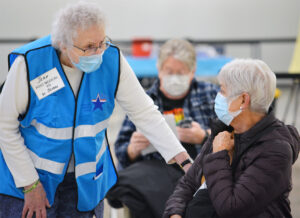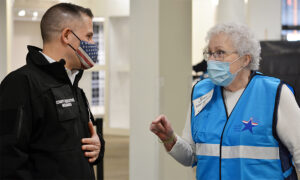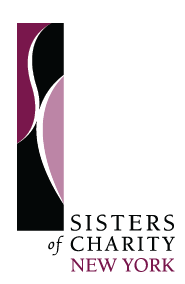The following is from the Spring 2021 issue of VISION.
By Lisa Shay, SC Associate

Sr. Jean with two women who just received their COVID vaccine at the Dutchess County Point of Distribution.
Partnership with the laity has been a Sisters of Charity model from the very beginning, since the first three sisters founded St. Patrick’s Asylum in 1817 at the behest of laymen Robert Fox and Francis Cooper. Usually, that partnership involves laypersons serving in Congregation-sponsored ministries, but sometimes the opposite is true. Sr. Jean Flannelly is an example of the latter case: a Sister of Charity who felt called to offer her expertise as a psychologist in a secular organization, the Medical Reserve Corps (MRC).
The MRC is a national volunteer organization founded in the aftermath of 9/11 to help communities with emergency preparedness and disaster relief. Sr. Jean first responded to a call to volunteer with the MRC in the family-support center for victims of 9/11. It was a great use of her Ph.D. in psychology and 28 years’ experience as a psychologist.
When COVID hit last March, she responded to a new call. The Dutchess County MRC was searching for volunteers to help assemble 3D-printed personal protective equipment. After a few Fridays of volunteering, she was so impressed with the organization, its culture, and the leadership of Coordinator Joe Ryan that she eagerly responded to the next call for contact tracers. Sr. Jean attended the four-hour training for contact tracing and additional hours of training for the MRC orientation and ongoing professional development. She spent the summer and early fall serving as a contact tracer. Then the MRC called for volunteers to complete case investigations. Once again, Sr. Jean responded, attending several more hours of training.

Sr. Jean and Dutchess County Executive Marc Molinaro
Since November, Sr. Jean has devoted every Monday to case investigations, often working eight hours each day. Case investigation requires skill in formulating open-ended questions and sensitivity when asking them. The case investigator calls people who have tested positive for COVID and seeks to learn the extent and severity of their symptoms. The investigator then explains the requirements of isolation, determine their recent contacts, and ask what their needs might be as they isolate.
Sr. Jean has been impressed with the array of support services that she can offer. Dutchess County has many services to help people safely accomplish the ten days of isolation, including food shopping, counseling, social services and medical assistance. Isolation requires staying at home, restricted to one room of a shared home. Unlike quarantine, there is no exception to go shopping for essentials.
One might expect people to be reticent about providing such personal information, but Sr. Jean has been amazed at how forthcoming her cases have been. Sometimes the conversations are particularly difficult: one woman revealed that her father had died from COVID the day before.
With the arrival of the vaccine, Sr. Jean has said “yes” to yet another call: assisting with distribution points. Joe Ryan invited her involvement because “she is a delight to work with and has an air that brightens everyone’s day. She has a knack for making others feel welcome, a part of the team.”
Whether laypersons serve in Congregation ministries or sisters serve in secular organizations, the Charism of Charity is inventive to infinity.

Great to see the depth to which Sr Jean has become involved in the ministry of outreach to those suffering effects from COVID. Thank you for your generosity of spirit.